On 10 Dec, about 100 activists gathered at the Victory Monument to join a ‘Fearlessness Walk’ to protest against the lèse majesté law.
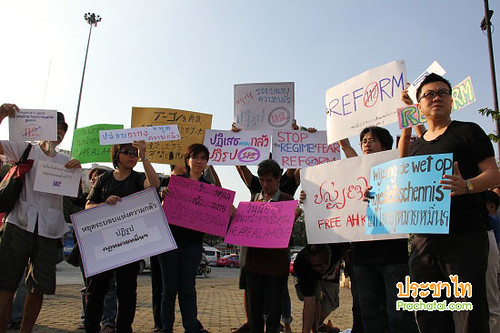
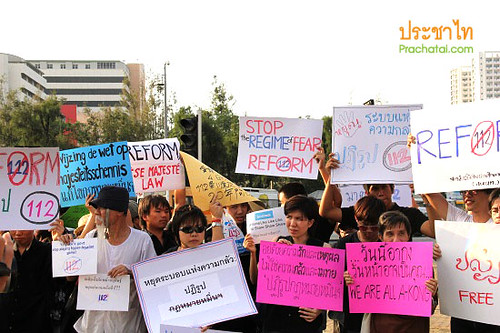
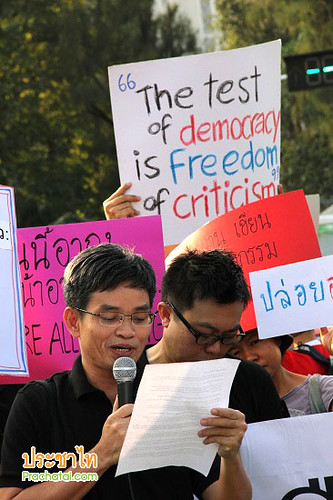

Wanrak Suwanwattana, one of the activists, said that the idea of the ‘Fearlessness Walk’ was initiated by Aung San Suu Kyi in Myanmar. This activity was the result of frustration felt in society in the past 3-4 years, and was inspired by a recent Facebook campaign for Amphon Tangnoppakul, in which people posted their photos with the message ‘Free Ah Kong’ written on their palms.
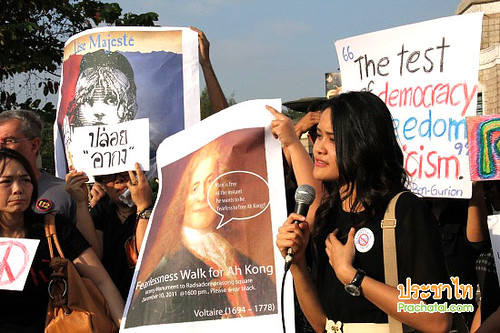
She said that the main goal of the activity was to communicate with the public about the problems of the lèse majesté law, and ‘Ah Kong’ or Amphon, who had recently been sentenced to 20 years in jail under the law, was the symbol of their rally.
Well-known social critic Sulak Sivaraks said that people should be reminded that the day was Thailand’s Constitution Day and the country was ruled under democracy with the King as Head of State, not ‘above the constitution’. The day was also International Human Rights Day. The constitution is important to Thailand, but human rights are important for all people in the world. However, now in Thailand there is no respect for either the constitution or human rights, he said.
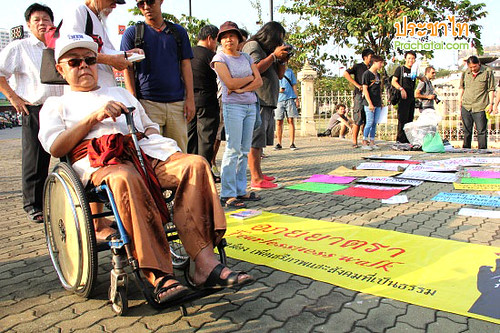
He said that since the Thaksin government, he had been prosecuted in three cases, in which Thaksin had pulled the strings. Now there are the cases of Amphon, who should never have been found guilty, and Suraphot Thaweesak, who has recently been summoned by the police on lèse majesté charges, despite the fact that his comments did not constitute any offence against the monarchy, Sulak said.
‘If this government is smart, it should stop all cases. Even His Majesty the King once said that lèse majesté prosecutions hurt himself,’ Sulak said.

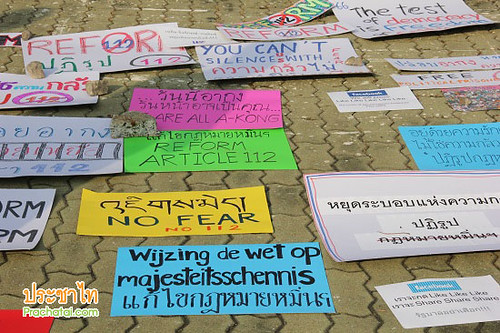
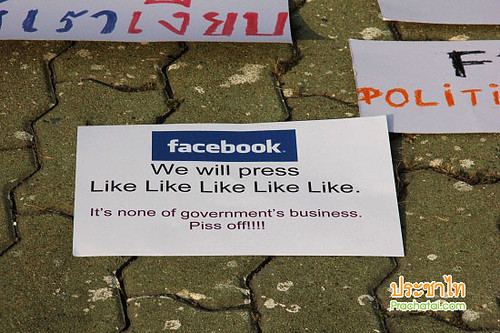
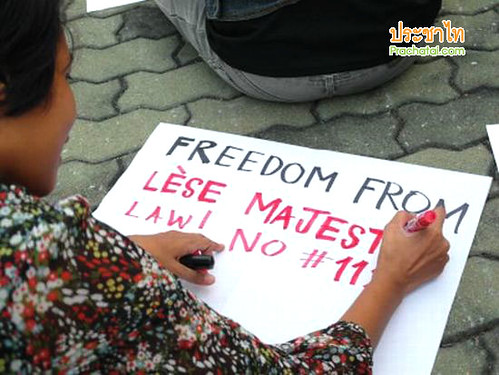

Suraphot, a university lecturer and Prachatai contributor, said that the lèse majesté law was against the principles of freedom and equality in democracy, and violated human dignity. The lèse majesté law is an injustice against the people as it impedes the freedom of the people to scrutinize ‘public figures’ who use taxpayers’ money, and it can punish people for just a few words with harsh imprisonment.
Pavin Chachavalpongpun, who initiated the ‘Free Ah Kong’ campaign on the internet, said that a book entitled ‘Thailand’s Fearlessness: Free Akong’ would be launched on 15 Dec.
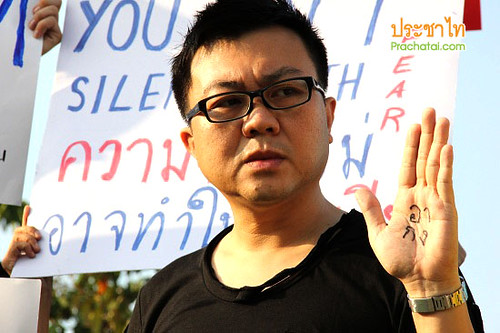
The activists marched from the Victory Monument to Ratchaprasong intersection.
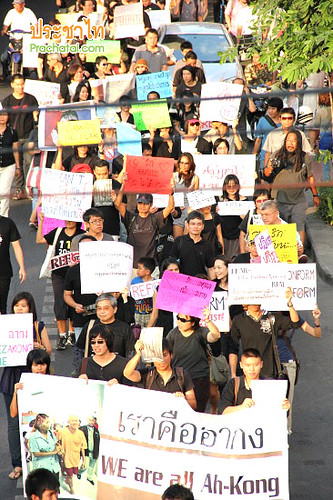
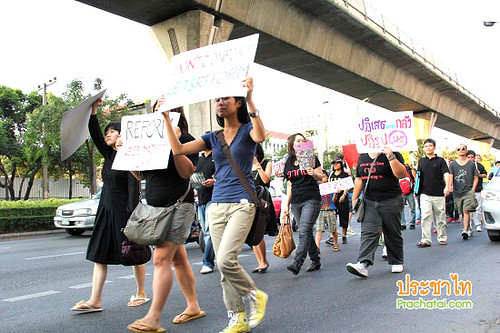
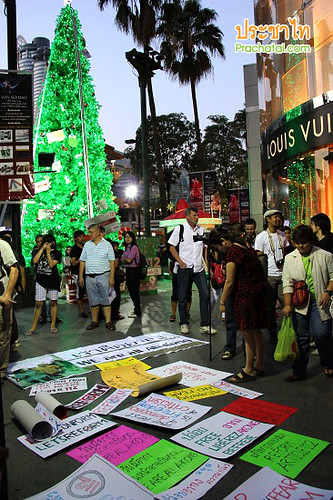
On the same day, in Chiang Mai, about 50 people also held a similar rally. They walked through a street which was closed for a weekly market and distributed leaflets about Article 112. After standing for the National Anthem at 6 pm, they all lay on the ground in a symbolic gesture.

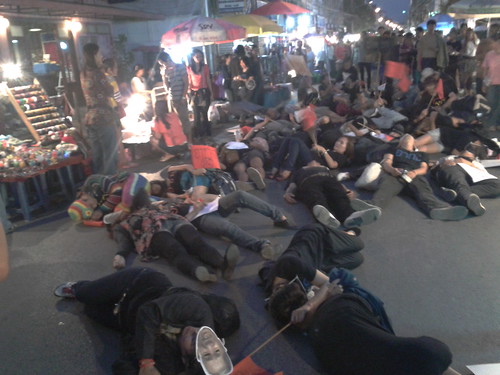
Rojarek Watthanapanich, one of the activists, said that as the day also marked International Human Rights Day, lying on the ground was a symbolic protest against the National Human Rights Commission which had still done nothing about the problems of the lèse majesté law.
A 26-year-old student activist said that on the day Amphon was given the jail sentence, he and other fellow students tried to organize an activity but failed as the police were keeping an eye on them and they felt unsafe.
Another student, 21, said that their rally was aimed at making the lèse majesté law a public issue. He would be glad if the issue is taken up and discussed by the public including the law’s proponents. However, he saw that Thai society was not mature enough to listen to different views as a result of the notion of people being unequal.
On 9 Dec, about 100 activists held a rally in front of the Criminal Court in Bangkok in light of its recent verdict to send Amphon to jail for 20 years.
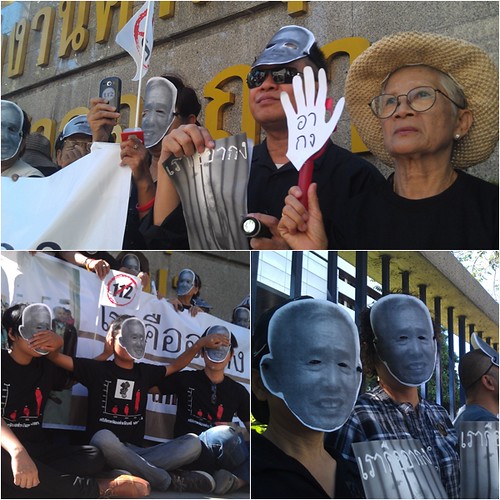
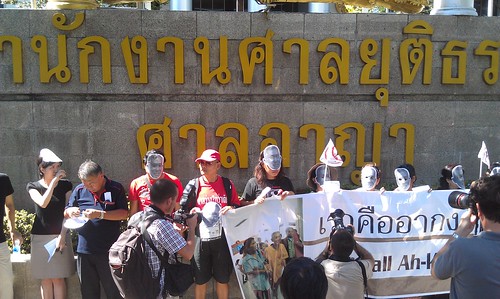
The activists, wearing black, stood in silence for 112 minutes, holding torches in their hands, symbolizing light in the darkness of society.

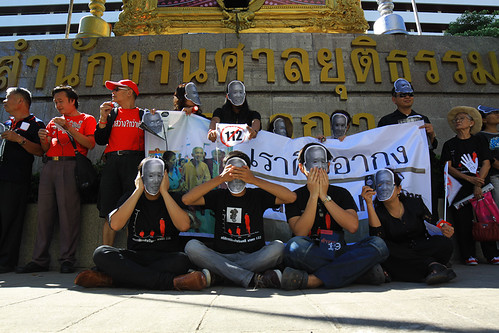
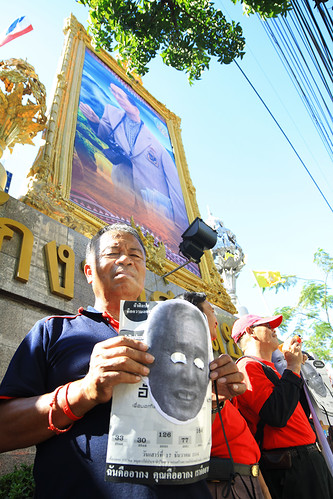
Pornchai Yuanyee, a student activist, said that the case of Amphon was unacceptable as the court could not prove that he was guilty, and he should have been freed.
He condemned the Yingluck government for not having solved the problem of the lèse majesté law.
‘We’ve elected the government to work for the people, but it has not done so. The government certainly sees the problem of Article 112, but it has done nothing,’ he said.
Prachatai English is an independent, non-profit news outlet committed to covering underreported issues in Thailand, especially about democratization and human rights, despite pressure from the authorities. Your support will ensure that we stay a professional media source and be able to meet the challenges and deliver in-depth reporting.
• Simple steps to support Prachatai English
1. Bank transfer to account “โครงการหนังสือพิมพ์อินเทอร์เน็ต ประชาไท” or “Prachatai Online Newspaper” 091-0-21689-4, Krungthai Bank
2. Or, Transfer money via Paypal, to e-mail address: [email protected], please leave a comment on the transaction as “For Prachatai English”
